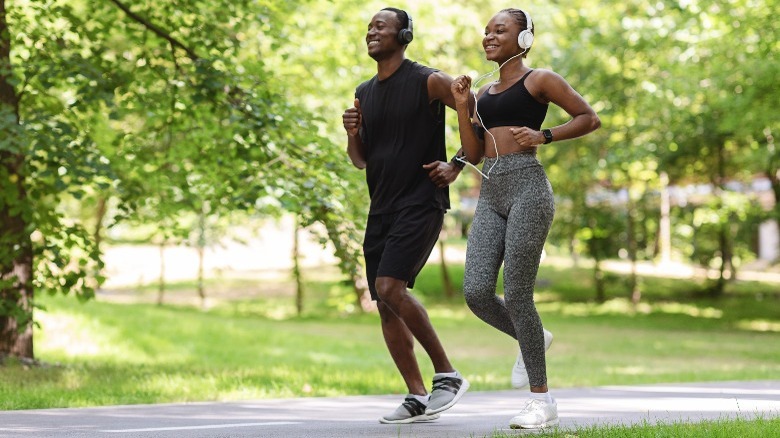Can Exercise Lower Blood Pressure?
Getting a high blood pressure diagnosis is not the kind of news you want to hear. However, if you take certain measures, you have the chance to lower it or at least keep it under control.
High blood pressure — or hypertension — is when your blood is pushing up against your blood vessel walls with too much force on a consistent basis (via American Heart Association). Also known as "the silent killer," high blood pressure is something you may not notice on your own, but it could be slowly damaging your arteries and endangering your heart, potentially leading to heart disease, heart attack, or stroke (via American Heart Association).
Causes of high blood pressure can vary. If you have a medical condition such as diabetes or you are obese, this puts you at greater risk for high blood pressure. If you engage in an unhealthy lifestyle, such as regularly eating unhealthy foods and remaining sedentary instead of exercising regularly can also lead to high blood pressure over time (via Centers for Disease Control and Prevention). The good news is that if your doctor recently diagnosed you with high blood pressure, there are ways you can potentially lower it without medication.
Activities that can help control your blood pressure
The experts at the Mayo Clinic point out that engaging in exercise can indeed play a part in lowering your blood pressure. However, don't expect to see results by just doing some one-off runs or taking an occasional bike ride. You should try to commit to roughly 30 minutes per day at least five days a week. And you'll want to focus on aerobic exercise such as cycling, running, and swimming. If these kinds of activities aren't your jam, dancing is also an excellent form of aerobic exercise. Also, taking regular brisk walks can help mitigate high blood pressure.
If you don't have time to engage in moderate activities most days, the experts at WebMD suggest that going for an invigorating jog for 20 minutes, three or four times a week can provide similar benefits. They note that you should not feel pressured to arrive at this level immediately but to gradually work your way up to this regular practice. Warm up for at least five minutes before exercising to wake up your body and keep injuries at bay. And make sure you plan your exercise in advance so you stick with it. If you're worried about maintaining your commitment, having an exercise buddy could help keep you accountable while also making the exercise experience more enjoyable, per WebMD. If you've been diagnosed with high blood pressure, be sure to check with your doctor about an exercise regimen that will be safe and effective for your situation.

